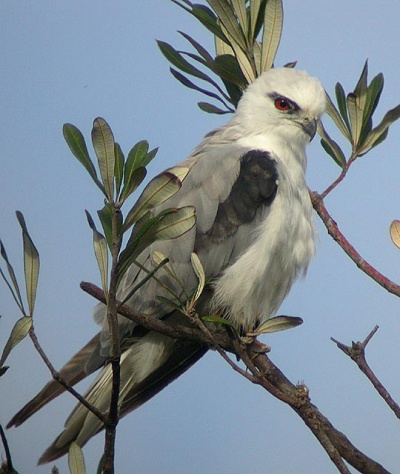Black-shouldered Kite redirects here. For the species Elanus caeruleus, see Black-winged Kite
Alternative Name: Australian Kite
- Elanus axillaris
Identification
35 to 38 cm in length and have a wingspan of between 80 and 95 cm.
Adult Black-shouldered Kites are pale grey with a white head and white underparts. The leading edge of the inner wing is black which is visible when perched and the reason for their name.
Similar species
Letter-winged Kite is the same size. It has a black mask which does not extend behind the eye (Black-shouldered's does). Its distinctive black underwing pattern extends to all coverts to give a fully black "arm": the black of Black-shouldered is restricted to the primaries and their coverts. In other parts of the world, other Elanus are similar.
Distribution
Present species is endemic to Australia.
Taxonomy
This is a monotypic species[1].
This taxon has been split from Elanus caeruleus (of Africa and Eurasia) which is called Black-winged Kite in Opus. One additional species from the same complex is White-tailed Kite (Elanus leucurus). However, several taxonomic authorities still use the name Black-shouldered Kite for Elanus caeruleus, and Australian Kite for the present species. There is therefore a lot of confusion in the naming of these species.
Habitat
Open woodland and grasslands; coastal sand dunes and salt marshes. Gardens, roadsides, sewage farms; overgrown scrub land
Behaviour
The diet consists mostly of mice. Grasshoppers, rats, small reptiles, and birds, are also taken.
References
- Clements, JF. 2009. The Clements Checklist of Birds of the World. 6th ed., with updates to December 2009. Ithaca: Cornell Univ. Press. ISBN 978-0801445019.
- Wikipedia
- BF Member Observations
Recommended Citation
- BirdForum Opus contributors. (2024) Black-shouldered Kite. In: BirdForum, the forum for wild birds and birding. Retrieved 26 April 2024 from https://www.birdforum.net/opus/Black-shouldered_Kite
External Links
GSearch checked for 2020 platform.1






